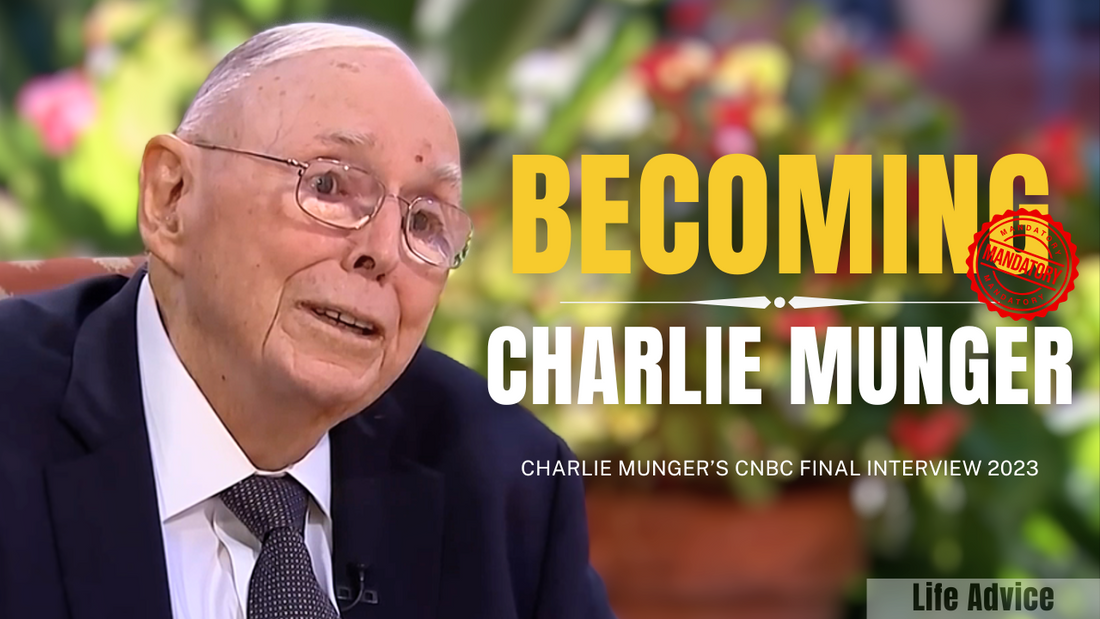
How Charlie Munger’s Family History Shaped His Billionaire Mindset! | Final Interview with CNBC 2023
[Transcript]
BECKY QUICK: But you are still a believer in the need for a government?
CHARLIE MUNGER: Of course. I'm a — If you get right down to it, what I am is a lover of the progress of civilization. That turns me on.
Oddly enough, the man whose name I bear, my father’s father, and my father’s mother both thought exactly the same way. They took me to church in the Presbyterian church and all that and Sunday School too, take on a lesson and all that. But when they really wanted to teach me something which turned them on, it was the legend of Robinson Crusoe, created by Daniel Defoe.
They just loved that guy creating a little English civilization on that goddamn vacant island. And that he could do it if he worked at it. And that, of course, that was the lesson they were trying to teach the grandchildren — and I was so amused by it that I could see immediately what they were trying to do. And I could see immediately that they were right.
Of course, even if you’re given a goddamn desert island, you can turn it into a civilization if you can. Civilization is important. I accepted all those moral lessons. Now, they never said, “This is what we’re trying to teach you. A-B-C.” But they did make me read Robinson Crusoe not just every week, but every night. Before I went to bed, I got a little dose of Robinson Crusoe.
There I was, a little tiny boy, and of course it was good for me. And, of course, I never got over it. I’m still following Robinson Crusoe’s method of going at life. That’s what I did. I imitated Robinson Crusoe. My grandfather’s teaching worked.
That was a funny way to raise grandchildren. I was the first grandchild on that side, and so I went down and lived there for weeks on end sometimes. So I got doses of all these lessons from Sunday School and also from Robinson Crusoe. And, of course, I really absorbed the Robinson Crusoe lesson.
Then, I was lucky with my ancestors on the other side of the family. I am very good at learning things from dead people. That’s what everybody should learn.
And so I had one grandfather on the other side whose life never overlapped mine. He was dead before I was born. But he was the richest man in his town and had an immense old house and he invited all the grandchildren to come in and stay every summer — as many of us as wanted.
And, of course, it’s fun to go stay with a rich old grandfather who kind of owns the town. And he was the majority owner of the main bank and armies of grandchildren.
The old man had been a pioneer. He had come there as a pioneer and lost all his money in some bank failure in the east. So, from absolute nothing as a pioneer in Iowa, he eventually made himself the richest man in his town and so forth. And he lived to be an old man, as you can imagine.
And what he loved to do was talk about the hard old days of living in a sod house — which is a cave! You moved into a cave in the winter. How many people want to raise two little children in a cave? Can you imagine yourself doing it?
BECKY QUICK: No.
CHARLIE MUNGER: In Iowa winters, living in a cave with two little children. Well, that’s what he gave his wife in marriage. And they, from that poor start, ended up with this huge success — by the standards of his time and place.
And he did that — he said he loved to talk about the early days because he was so proud of having survived them — the Indian wars and everything — so he was pleased to talk about it. It reminded him of all he surmounted.
My Grandmother Ingham wouldn’t talk with the grandchildren about the early days. If they tried to talk about it, she said, “They were mean, hard days. I don’t like to remember them. Don’t talk about them in front of me.” She wouldn’t allow people to talk about the early days.
But Grandfather Ingham just talked endlessly about the early days and how he’d surmounted all these hardships. And what he taught the grandchildren, of a fiscal nature, he said, “You know, people think Iowa is the best farmland in the world and I own a lot of it. It’s a good place to have a bank and I own the main bank.”
And he said, “It looks pretty easy looking back at it in retrospect, but it was damn hard, I want you to know." And he said, “In reviewing my life, what you grandchildren have to realize” — it was his version of Robinson Crusoe, he taught every grandchild — “is when they give you a real opportunity, the world’s not going to do it very often, you’re only going to get three or four of these invitations to the pie counter. And when you get your invitation, for God’s sake, don’t take a small helping.” (Laughter)
He basically said, “Lever up when you’re sure you’re right.” And, of course, that’s good advice. But “be sure you’re right” is what makes it hard. How can you be sure you’re right?
BECKY QUICK: Yeah.
CHARLIE MUNGER: Well, but that’s the point. You can’t do it very often. Just a few times in a lifetime. Even if you’re Grandpa Ingham or Warren Buffett, you only get a few trips to the pie counter.
If you take out of Warren Buffett’s life the ten most important trips to the pie counter, his whole record would look like dung. It would be just worthless. We knew enough to take a good helping when we were offered a trip to the pie counter.
Now, we did take way smaller of a helping than we could’ve easily handled. Berkshire could easily be worth twice what it is now and the extra risk we would’ve taken would have been practically nothing. All we had to do was use just a little more leverage that was easily available.
BECKY QUICK: In hindsight, are you glad you didn’t, you know, just from the potential risk?
CHARLIE MUNGER: Well, it’s an interesting example. The reason we didn’t is the idea of disappointing a lot of people who had trusted us when we were young.
If we lost three-quarters of our money, we were still very rich. That wasn’t true of every shareholder. And losing three-quarters of their money would have been a big letdown, so we were very cautious in dealing with our shareholders’ money.
If Warren and I had owned Berkshire without any shareholders that we knew, we would have made more. We would’ve used more leverage.
Source: https://youtu.be/H5Oom5Rjp_Y?si=ZEkkZkAN6WyOWcl9
[YAPSS Takeaway]
“The pie counter” metaphor means life only gives you a handful of great opportunities. When one comes, don’t take a small slice. Take a big swing — but only if you're sure you're right.
